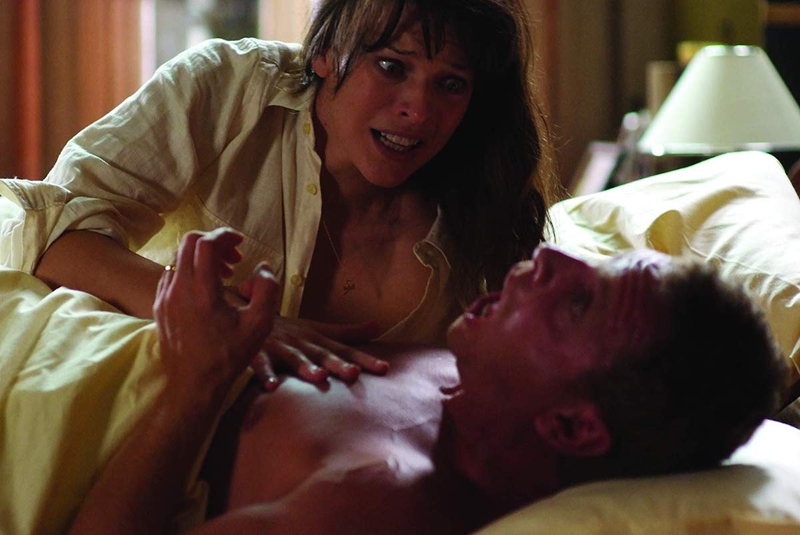Editor's Note: This was originally published for FANGORIA on November 5, 2009, and we're proud to share it as part of The Gingold Files.
The trick to making a successful vérité horror film, especially in this post-Blair Witch age of audience skepticism, is not forcing the issue that the events on screen are real. The makers of The Fourth Kind have geared their campaign toward encouraging viewers to make up their own minds, but the more the movie itself insists—frequently and blatantly—that it’s authentic, the harder it is to buy any of it, undercutting a number of genuinely creepy sequences.
The movie lays it on thick right away as star Milla Jovovich addresses us directly, telling us that what we’re about to witness is all based on true case histories, followed by, “Please be advised that some of what you’re about to see is extremely disturbing.” (To which the more cynical onlookers might well reply, “We’ll be the judge of that.”) Subsequent plane’s-eye views approaching the central setting of Nome, Alaska will also set off the b.s.-meters of anyone who knows that the city is actually situated on a flat harborside area, not nestled within picturesque/ominous mountains as seen here (the exteriors were lensed in Bulgaria). There have been, we’re told, a disproportionate number of strange events and disappearances in Nome over the years, to the extent that the FBI has investigated—and that part, at least, appears to be true.
It’s actually kind of a shame that The Fourth Kind’s extraterrestrial explanation for the odd goings-on is given away in all of the marketing and advertising, since writer/director Olatunde Osunsanmi clearly means to build a sense of mystery into the first 40 minutes or so. Jovovich plays Dr. Abigail Emily Tyler, a Nome psychologist whose patients have been reporting bouts of sleeplessness and worse, with the spooky visages of white owls appearing outside their windows. (Before outer-space visitors are identified as the threat, there’s more than a hint that demonic possession might be involved; one of those patients levitates, and a strange voice on one of Dr. Tyler’s session tapes proves to be speaking ancient Sumerian.) Our heroine has psychological troubles of her own; under hypnosis by colleague Dr. Abel Campos (Elias Koteas), she flashes back to the murder of her husband by an intruder before her eyes. And if that isn’t enough to deal with, a man she has been treating goes berserk one night, taking his family hostage and ultimately killing them and himself as the police close in.
Osunsanmi dramatizes all this like the slickest supernatural-reality TV show you ever saw, juxtaposing the actors’ scenes with a videotaped interview of the “real” Dr. Tyler by the writer/director himself, purported news-camera footage of moments like the family shootings (though it strains plausibility that something like this would be released for use in a mass-market entertainment) and audio interviews with the people involved in the events. The names of several individuals are identified as aliases for an extra touch of verisimilitude, and the “real” Dr. Tyler’s speech frequently bleeds into the same words being spoken by Jovovich. Osunsanmi is clearly trying very hard to establish a factual basis for everything, but the effort undercuts the effect, as if the writer/director doesn’t trust his allegedly bona fide material to speak for itself. A greater emphasis on either the docudrama or found-footage approaches, rather than constantly having them bump up against each other to nudge the viewer about the veracity of it all, might have been more effective.
So…for a viewer who walks in with the point of view that it’s all fictitious, and isn’t distracted by Osunsanmi’s editing-suite hocus-pocus, how does The Fourth Kind work on a basic creep-out level? Pretty well at a number of points, particularly when it comes to the glimpses of the “real” Dr. Tyler; whoever she may actually be, she’s convincingly haggard and haunted by her frightening experiences, a few of which, as seen on grainy, interference-plagued video, also deliver the chills. Ironically, she kind of shows up Jovovich’s turn in the same role—not that Jovovich is bad (the actress gets to explore more depth here than in all her Resident Evil flicks combined), but her performance can’t help but look more like a performance when seen alongside her “actual” doppelganger.
Still, it’s hard not to feel for her as the invasions literally hit closer to home, even as the alien-abduction scenes are familiar from past movies and TV dramatizations, and there’s a late revelation involving Dr. Tyler that just doesn’t make sense. Koteas lends sturdy support in a role not unlike the one he played in The Haunting in Connecticut (produced by the same company, Gold Circle), while Will Patton’s disbelieving, accusatory sheriff is overdone, delivering lines like “You can’t just stop being insane when you want to—it’s the kind of thing that stays with you forever!”
The Fourth Kind makes for an interesting comparison with Paranormal Activity, which is as subtle as Kind is insistent (though it’s likely Universal didn’t know it would have reality-horror competition when, last July, it slotted Kind to fill the space left by the departing Wolfman). A number of people have found Activity too slow for their tastes, but for this reviewer, the unemphatic pacing and gradual buildup help make it feel more like life. In Fourth Kind, on the other hand, the more events and testimonials Osunsanmi piles on (he himself even appears with Jovovich at the end to speak to us one last time), the more it feels like just a movie.






